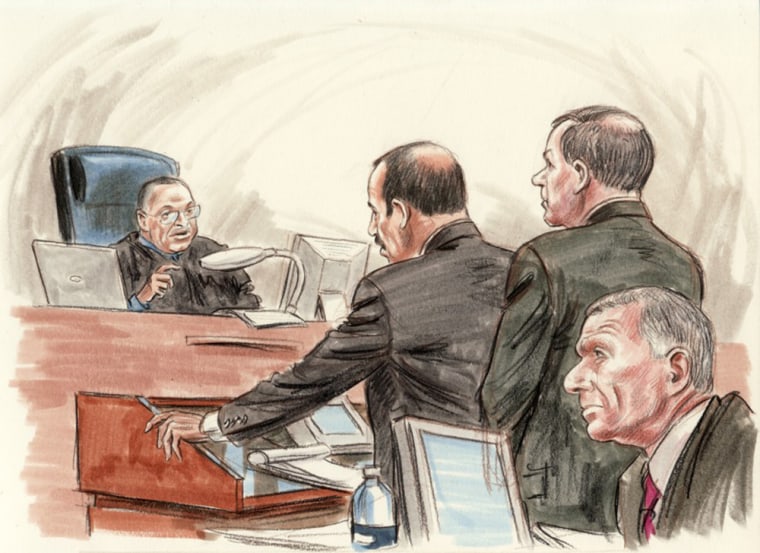The testimony phase of the long-anticipated trial of former White House aide I. Lewis "Scooter" Libby ended with a whimper rather than the bang of testimony from high-profile defense witnesses like Vice President Dick Cheney and Libby himself.
Libby's attorneys rested a trimmed down defense Wednesday after the judge barred much of their classified evidence because Libby decided not to testify in his perjury trial.
Special Prosecutor Patrick Fitzgerald wrapped up the government's rebuttal in minutes.
That clears the way for the jury to hear closing arguments next Tuesday over whether the former chief of staff to Cheney lied to the FBI and a grand jury about whether he leaked to reporters in 2003 that Valerie Plame, the wife of prominent Iraq war critic Joseph Wilson, worked for the CIA.
Trial showed Cheney-Wilson connection
In 14 days of testimony, the trial never filled an overflow courtroom, with a video hookup, to handle the crowds expected - particularly for the cross-examination of Libby and Cheney.
Nevertheless, testimony showed that Cheney was intimately involved on a daily basis in July 2003 in rebutting Wilson's allegations that President Bush had lied about intelligence to push the nation into war with Iraq.
Cheney was described by his own aides as particularly upset that Wilson suggested the vice president knew one key justification - that Iraq was seeking uranium in Africa for nuclear weapons - had been debunked by Wilson in 2002.
The defense put in a handwritten note in which Cheney told the White House press secretary to exonerate Libby in the leak and not sacrifice him to protect Bush's top political adviser, Karl Rove.
Celebrity witnesses
The trial also brought top-level Washington reporters, including five Pulitzer Prize winners, and some of their usually unidentified government sources into the courtroom. The defense, with limited direct evidence to rebut the government's case, used these witnesses to raise questions about the memory, techniques and ethics of reporters who had testified against Libby.
In the process, they illuminated the interactions between top reporters and officials.
The government case marched chronologically through the tumultuous spring and summer of 2003, when the administration was embarrassed that U.S. forces in Iraq had not found any of the weapons of mass destruction that Bush had used to justify the war.
Fitzgerald's goal was to render Libby's statements to the FBI and the grand jury unbelievable.
Libby acknowledged that he was first told of Plame's CIA job by Cheney on June 12, 2003, but he claims that he forgot it amid the many national security issues he dealt with. Libby told investigators that he thought he was hearing about her job for the first time on July 10 from NBC Washington bureau chief Tim Russert and thereafter only told reporters he had heard about the job from other journalists.
Russert testified he and Libby never talked about Plame at all.
(MSNBC.com is a joint venture of Microsoft and NBC Universal.)
An undersecretary of state, a CIA official and Cheney's own top press aide all testified they told Libby about Plame's job between June 11 and July 6. Another CIA official said Libby discussed her job with him before the Russert call.
Former White House press secretary Ari Fleischer testified that Libby told him about Plame's job just three days before the Russert conversation.
Then former New York Times reporter Judith Miller and former Time magazine reporter Matt Cooper testified Libby told them that Wilson's wife worked at the CIA and had the idea for sending Wilson on a trip to Africa to investigate the uranium report. Wilson had suggested Cheney's questions were the reason for his trip.
Finally the prosecution called an FBI agent to testify about Libby's denials of leaking and played eight hours of his grand jury testimony denying he leaked.
The defense called six reporters who talked to Libby in that period but didn't recall hearing anything about Plame from him. None, however, could recall specifically asking about her.
They introduced evidence of memory flaws on the part of Miller and Russert, and questioned whether Russert had it in for Libby because the case got Russert subpoenaed to discuss confidential sources. One defense witness, Washington Post reporter Walter Pincus, testified Fleischer leaked Plame's job to him, directly contradicting Fleischer's denial of that under oath. An FBI agent recalled that Russert wasn't able to completely rule out that he and Libby discussed Plame.
